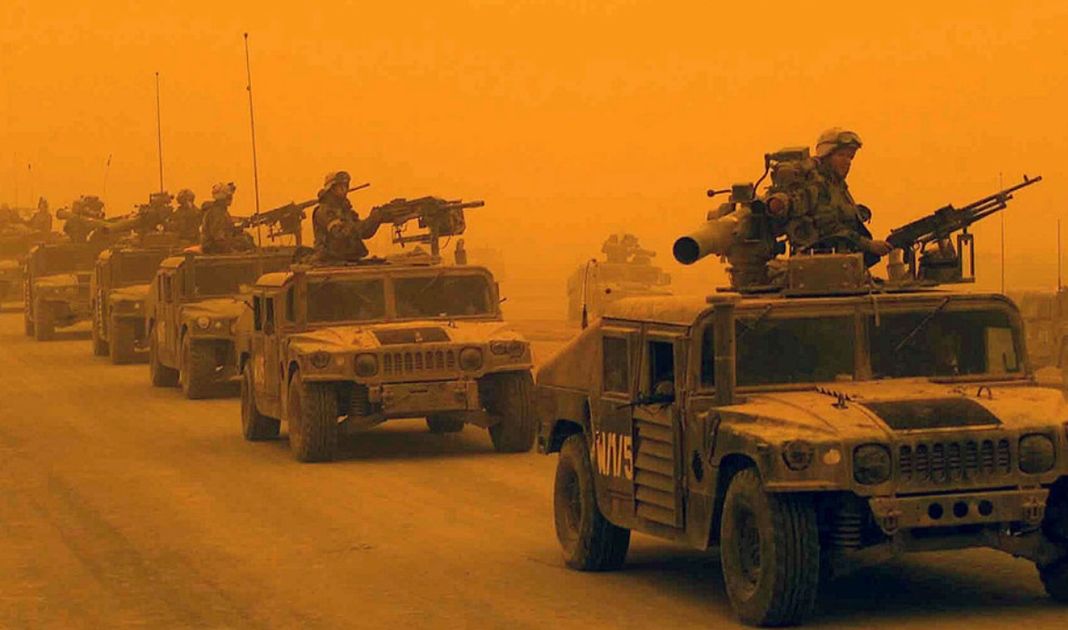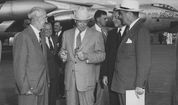The Last 21 Years: Year (2)003

(Source: Wikimedia Commons)
Iraq Is Hot! As a matter of fact, you may be so busy when you reach Iraq that you won’t see much of anything for awhile. Probably you will feel Iraq first—and that means heat. Blazing heat. And dust. In the daytime Iraq can be one of the hottest spots in the world.” This description comes from A Short Guide to Iraq (1942), produced for American soldiers deployed to the country during the Second World War. Sixty years later, it was clear that US troops would be heading back to the country once again, this time in much larger numbers and under much greater scrutiny, even – seemingly – on a minute-by-minute basis.
On 22nd January 2003, US Defence Secretary Donald Rumsfeld was asked about European opposition to the war in Iraq. He replied – correctly – that Europe was not a monolith: “You’re thinking of Europe as Germany and France. I don’t. I think that’s old Europe. If you look at the entire Nato Europe today, the centre of gravity is shifting to the east and there are a lot of new members.” It’s also worth noting that in Germany, there was a left-right divide. Whilst Chancellor Gerhard Schröder (from the centre-left SDP) was firmly anti-war, the opposition leader Angela Merkel (from the centre-right CDU-CSU) took more of a pro-US line. Interestingly, with this in mind, centre-right President Jacques Chirac of France was opposed to the war whilst centre-left President Aleksander Kwaśniewski of Poland, one of the new members mentioned by Rumsfeld, was supportive of the US.
There were huge anti-war street protests on 15th February 2003, with hundreds of thousands taking part in each of the biggest marches in Madrid, Barcelona, London, Rome, Berlin, New York, San Francisco, Sydney, Melbourne, Athens, Paris and Montreal. Arguably the most important of these demonstrations was the one in London, where Prime Minister Tony Blair was under pressure to withdraw Britain’s support from the war effort. One of the speakers to address the huge crowd at the final stage of the march was left-wing Labour MP Jeremy Corbyn, who asked: “Why are we spending three and a half billion pounds on a war that nobody wants when there is an AIDS pandemic sweeping Africa, when a quarter of the world’s children die in poverty and starvation, and we say there isn’t enough money sufficient for our own public services? Thousands more deaths in Iraq will not make things right. It will set off a spiral of conflict, of hate, of misery, of desperation that will fuel the conflict, the terrorism, the depression and the misery of future generations. Our message … is this: we want to live in a world free from war. The way to free us from the scourge of war is to free ourselves from the scourge of injustice, of poverty, and the misery that is associated with that. This movement is giving that message to the British government: stop now or pay a political price!”
President George W. Bush’s announcement of the invasion on 19th March 2003 came with a clear aim. This was to be framed as a just war and a humanitarian mission: “At this hour, American and coalition forces are in the early stages of military operations: to disarm Iraq, to free its people, and to defend the world from grave danger. To all the men and women of the United States armed forces now in the Middle East, the peace of a troubled world and the hopes of an oppressed people now depend on you.” Troop numbers are obviously unmentioned here but this was to be the biggest US military involvement since the Vietnam War, when at least 150,000 troops had been stationed in Vietnam in the seven-year period between 1965 and 1971 (rising to over 500,000 in 1968). In Iraq, for a six-year period between 2003 and 2008, troop numbers would hover around but never rise much above the 150,000-mark.
On 21st March 2003, with fighting now well underway, Rumsfeld commented on the large presence of war reporters embedded with US and coalition forces: “I think we’re probably watching something that is somewhat historic. We’re having a conflict at a time in our history when we have 24-hours-a-day television, radio, media, Internet, and more people in the world have access to what is taking place. You couple that with the hundreds, literally hundreds of people in the free press — the international press, the press of the United States, from every aspect of the media — who have been offered and accepted an opportunity to join and be connected directly with practically every aspect of this campaign. And what we are seeing is not the war in Iraq. What we’re seeing are slices of the war in Iraq. We’re seeing that particularised perspective from that reporter or that commentator or what that television camera happens to be able to see at that moment. And it is not what’s taking place. What you see is taking place, to be sure, but it is one slice. And it is the totality of that that is what this war is about and being made up of. And I don’t — I doubt that in a conflict of this type there’s ever been the degree of free press coverage as you are witnessing in this instance.”
Embedding reporters with military units was a tactic learned from the British in the Falklands War in 1982, when – as Phillip Knightley explains – “They [the British] excluded all neutral and American war correspondents. The American press decided it might send a couple of ships down there, only to be told by the British Ministry of Defence that if they did, they’d be fired upon. The war correspondents on board the British ships there relied on the ships and the British military establishment for their communications, so – with that control – nothing was reported that the military didn’t really want reported.”
If the embedded reporters were, to an extent, playing a “cheerleader” role in the invasion, reporting what the US military wanted reporting, then – as Christopher Dickey of Newsweek argues – there was also a big appetite for such reporting amongst the popcorn-eating audience back at home (at least initially): “Television viewers don’t like to think. That’s not the point of watching television: it’s to share the experience. It’s to be bathed in the moment. It’s not about thinking. And the US knows that and they exploit it. … It’s very exciting. So are arcade games exciting. It’s wonderful because you feel the fear but you’re safe. And it’s a wonderful way to get everybody caught up in the experience of the war or what seems to be the experience of the war but — if you’re seeing a lot of dead people, it’s a different experience.”
On the other hand (on the other side), a 24-hour news channel launched in 1996 and based in Doha, was presenting the war from the civilian perspective. Osama El-Sherif, editor of The Star (an Amman-based newspaper) said in 2003, that “Al Jazeera is definitely talking to the Arab masses and I think this is what makes it so popular, so influential. There is definitely no comparison between what Al Jazeera is doing and the message that Al Jazeera is carrying and that of CNN. They show sympathy towards the Iraqi case, that’s very obvious, and I think that plays with Arab feelings. Most of the Arabs view this as an invasion rather than a war of liberation in that sense. But that has not really been at the cost of sacrificing Al Jazeera’s independence and its balanced, and what I would even call its objective coverage of the war.”
It was on 9th April, three weeks after the invasion began, that the jubilant scenes from Firdos Square of Saddam Hussein’s statue being toppled by a US-operated M88 recovery vehicle and stamped upon by locals were broadcast live. From a distance however, it was clear to see that many of the bystanders were indifferent. Robert Fisk later called it “the most staged photo opportunity since Iwo Jima.”
On 1st May, President Bush landed aboard a San Diego-bound US aircraft carrier in a Lockheed S-3 Viking using the ship’s arrestor gear — not as the pilot, it should be added (although he had served in the Texas Air National Guard). “Major combat operations in Iraq have ended,” he declared on deck, still wearing his flight jacket. “In the battle of Iraq, the United States and our allies have prevailed. [Applause.] And now our coalition is engaged in securing and reconstructing that country. In this battle, we have fought for the cause of liberty, and for the peace of the world. Our nation and our coalition are proud of this accomplishment — yet, it is you, the members of the United States military, who achieved it. … This nation thanks all the members of our coalition who joined in a noble cause. We thank the Armed Forces of the United Kingdom, Australia, and Poland, who shared in the hardships of war. We thank all the citizens of Iraq who welcomed our troops and joined in the liberation of their own country. And tonight, I have a special word for Secretary Rumsfeld, for General Franks, and for all the men and women who wear the uniform of the United States: America is grateful for a job well done.”
Four occupation zones were established. Polish forces were asked to take responsibility for one of them in September 2003, Multinational Division Central-South (predominantly Shiite). This was a signal to Moscow that Poland was not only a NATO member but was closely aligned with the Anglosphere nations. Thomas Friedman said in December 2003 that, “After two years of traveling almost exclusively to Western Europe and the Middle East, Poland feels like a geopolitical spa. I visited here for just three days and got two years of anti-American bruises massaged out of me. Get this: people here actually tell you they like America – without whispering. What has gotten into these people? Have all their subscriptions to Le Monde Diplomatiqueexpired? Haven’t they gotten the word from Berlin and Paris? No, they haven’t. In fact, Poland is the antidote to European anti-Americanism. Poland is to France what Advil is to a pain in the neck. Or as Michael Mandelbaum, the Johns Hopkins foreign affairs specialist, remarked after visiting Poland: ‘Poland is the most pro-American country in the world – including the United States.’”
December 2003 also saw the publication of a journal by a neoconservative think tank, the American Enterprise Institute, titled “The View From Abroad.” In one of the essays (Europe’s Anti-American Obsession), Jean-François Revel argued that his native France could learn something from the US: “Tens of millions of immigrants have streamed into the United States. If the picture of America drawn by the European press is accurate, then those immigrants from all parts of the world were deluded fools. Why choose the American capitalist jungle with all its evils, rather than the lands of peace, plenty, and liberty they came from? Why didn’t they write their families and friends basking in the paradises of Ukraine, Calabria, and Greece warning them of the perils of poverty, precariousness, and oppression in America? The success and originality of American integration stem precisely from the fact that immigrants’ descendants can perpetuate their ancestral cultures while thinking of themselves as Americans in the fullest sense, sharing basic ideals across racial and ethnic barriers. In France, the characteristic attitude of newcomers from North Africa, Turkey, and sub-Saharan Africa is predominantly one of alienation, confrontation, rejection, and hatred.”
Compare this with Angela Merkel’s February 2003 opinion piece for the Washington Post – titled “Schröder doesn’t speak for all Germans” – in which she says that “the Eastern European candidate countries for membership in the European Union are attacked by the French government simply because they have declared their commitment to the transatlantic partnership between Europe and the United States. … The danger from Iraq is not fictitious but real.” Speaking on behalf of the CDU/CSU, she says: “our close partnership and friendship with the United States is just as much a fundamental element of Germany’s national purpose as European integration. But both will be successful only if it is possible to build new trust and we are able to formulate our own interests. There is no acceptable alternative to this way forward at the beginning of this new epoch.”
The logic of Rumsfeld’s argument that Europe’s centre of gravity was shifting eastwards was that the German-French axis would eventually be replaced by a German-Polish axis. And here, there were signs that Merkel agreed. Meanwhile, France was having to deal with the serious problem of “alienation, confrontation, rejection, and hatred” amongst its Banlieue-based ethnic minorities, not to mention the economic challenges presented by the recently introduced 35-hour-week and the fact that more manufacturing jobs would soon be moving eastwards with EU enlargement. Interior Minister Nicolas Sarkozy sought to ease communal tensions by calling for “a training institute for the imams of France, who speak French, who are imbued with our culture,” citing figures which claimed that 60% of imams in France did not speak French. However even a moderate state-sponsored form of Islam would have to be uncomfortably (and expensively) positioned somewhere between Saudi- and Qatari-funded Wahhabism on the one hand and France’s Catholic and secular traditions on the other – this in a country where the National Front could count on 17.8% of the vote in 2002, rising to 33.9% in 2017.
Roman Abramovich, aged just 36 but thought to be the second-richest man in Russia, bought Chelsea Football Club in the summer of 2003 for £140 million. The “quiet Russian” – a former Yeltsin advisor who’d bought up Siberian oil fields in the mid-1990s – now began ploughing huge amounts of money into the club (£2 billion in ten years), earning himself an international profile at a time when Vladimir Putin’s government was beginning to jail and seize the assets of other Yeltsin oligarchs: for example, Boris Berezovsky, granted asylum in the UK in September 2003 (following the assassination of FSB critic Sergei Yushenkov), and Mikhail Khodorkovsky (the richest man in Russia), arrested for tax evasion and fraud in October 2003.
There was a late entry to the great game of manned spaceflight. Back in 1961, Yuri Gargarin had become the first person sent into space by the Russian Space Program on Vostok 1 (launched 12th April from Baikonur, Kazakhstan). Just weeks later, Alan Shephard became the first person sent into space by the American Space Program on Freedom 7 (launched 5th May from Cape Canaveral, Florida). Now, forty-two years later, Yang Liwei became the first person sent into space by the Chinese Space Program on Shenzhou 5 (launched 15th October 2003 from Dongfeng Space City in the Gobi Desert of Inner Mongolia), making China only the third country to send humans independently into space. It would be just the first in a timeline of multiple achievements for the Chinese Space Program over the years to come.
The massive Three Gorges Dam on the powerful Yangtze River had been under construction since 1994 and was to be opened in three phases, with the first phase in 2003. This was another proud moment for the Chinese leadership, especially its incoming President Hu Jintao (a hydropower engineer), but also for the rest of the nine-man Politburo Standing Committee, which included seven more engineers and, in Prime Minister Wen Ziabao, a geologist specialising in geomechanics. As Nectar Gan writes, “For China’s imperial rulers, the ability to harness rivers … gave legitimacy to their reign, as natural disasters were taken as a sign that the emperor had lost the mandate of heaven, by which he ruled.” Critics claim that the Three Gorges Dam has in fact contributed towards minor natural disasters such as landslides and flooding. And its catastrophic failure would clearly be interpreted as bad omen in a country that has known times of chaos and instability. To be clear, it would result in the deaths and displacement of millions of people downstream (for example Wuhan). So this was an incredibly high-stakes project but, at the same time, its success – its structural integrity – boded well for the regime’s survival.
Of course, the people we put our faith in when it comes to such matters are engineers – and, of all the nations, it would be reasonable to expect that China has some of the best. 2003 was the year of the first PISA tests of 15-year-olds across a selection of different OECD countries in Mathematics. Students from Hong Kong outperformed everyone else (followed by Finland, South Korea and the Netherlands). This reflected a strong (localised) average. At the top end, Chinese teams were regular winners of the International Mathematics Olympiad: in 1989, 1990, 1992, 1993, 1995, 1997, 1999, 2000, 2001, 2002. I.e. ten times in the last fifteen years.
A contender for nonfiction book of the year was “The Geography of Thought: How Asians and Westerners Think Differently…and Why” (2003), in which social psychologist Richard Nisbett argued that behaviour, ways of thinking, are not hardwired but cultural. Whereas the Ancient Greeks valued agency, the Ancient Chinese valued harmony(or collective agency): “Every Chinese was first and foremost a member of a collective, or rather of several collectives – the clan, the village, and especially the family. The individual was not, as for the Greeks, an encapsulated unit who maintained a unique identity across social settings. … The chief moral system of China – Confucianism – was essentially an elaboration of the obligations that obtained between emperor and subject, parent and child, husband and wife, older brother and younger brother, and between friend and friend. Chinese society made the individual feel very much a part of a large, complex, and generally benign social organism where clear mutual obligations served as a guide to ethical conduct. Carrying out prescribed roles – in an organized, hierarchical system – was the essence of Chinese daily life. There was no counterpart to the Greek sense of personal liberty. Individual rights in China were one’s ‘share’ of the rights of the community as a whole, not a licence to do as one pleased.”
In a brilliant 5,000-word essay for Harvard Business Review called The Chinese Negotiation, John Graham and Mark Lam noted that “American and Chinese approaches often appear incompatible. All too often, Americans see Chinese negotiators as inefficient, indirect, and even dishonest, while the Chinese see American negotiators as aggressive, impersonal, and excitable. … For Westerners eager to do business in China, here is the last word: Move now, and learn the rules of the game by developing the guanxineeded to grow your business there. Don’t expect immediate results. Old friendships work their magic through time; every year invested in China now will pay off in the future—because in a world of millennia-old memories, relationships of the moment need long and patient nurturing.”
Interestingly, 17 years after the Chernobyl disaster of 1986 heralded the downfall of the USSR, the SARS outbreak (now known as SARS-CoV-1) led the Economist to ask in an April 2003 article if this was “China’s Chernobyl?” 17 years later, people were asking the same question — word-for-word — about SARS-CoV-2. The word that springs to mind is “excitable”!
Autor
Thomas Riley
Thomas Riley runs the Flows and Frictions podcast for Strategy&Future. Originally from Manchester, England, he has been living and teaching English in Katowice since 2009.






Trwa ładowanie...